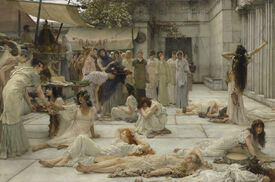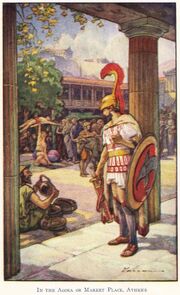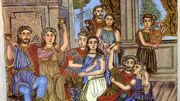
Women in a greek agora. The Women of Amphissa, by Sir Lawrence Alma-Tadema (p.d.)
A city of art, a city of culture, a city of opportunity and learning. It is also a city of secrets, a city of dark memories, built as a refuge for the psychically capable. In Phaeselis, the psychically capable are protected, free, and ready to live their lives as they feel to without persecution. But Phaeselis isn't an utopia. Like any other city, there are secrets. The Supernatural is expected and trechery lies in the deepest, scariest parts of the city. Phaeselis isn't perfect, and it abounds with adventure, danger, intrigue, dark magic, dark psionic power, and secrets both arcane and psychic.
The Player's Guide is designed to help you understand the city. It's to help you gain plenty enough knowledge of the city and create and run a character within a believable world. The city is rich in detail, so you won't be able to absorb it all at once. This is what the wiki is for, to allow you to jump to the parts that are relevant.
Introduction to Phaeselis[]
You are native of a city that is dominated by a waterfall that flows in four falls, or you just arrived here. The central falls is wide and powerful enough to be called a cateract. While the falls on the other sides are falls that are different kinds of falls: one cascade falls and two smaller punchbowl Falls that drain into the River Pheonix. The River drains into an estuary some six miles to the west of the city, but the river is deep enough to allow ocean going boats to ride up the river and dock at the docks.
Native or not, you know a few things about this city. It's not without a reputation, to say the least. To the people within the city, it's called the City of the Gifted as Alexander called it. To the people without and those arriving, positively it is known as the City of Psionics. However it has been cursed to be called the City of the Mindbenders, the City of the Cursed, The City of the Mind Mages, and the City of the Mānasika Ŗṣyyōrṅ. It is a refuge of the Awakened, as the Gifted call themselves. But it is not utopia. Like any city, it is constantly evolving. The city is dynamic, like a living thing. The city's population lives and breathes, and brings life to the metropolitan life.
A Hellenistic City[]

A normal day in an Agora.
Phaeselis is a Hellenistic city. This means that the city was steeped in Hellenic (or Greek, or better yet, Greek like) culture and science. Phaeselis is a city where most of the people have Ancient Greek faces, wear ancient greek clothing or asian clothing, and experienced progress in the arts, exploration, literature, theatre, architecture, music, mathematics, philosophy, and science.
Phaeselis is considered to be all a part of the Hellenic world that Alexander built. As a Hellenic City, Phaeselis is practically it's own kingdom (city state or principality) within the Hellenic World as Alexander built the city to be a homeland for all the Psychically gifted in his Empire. When he promised that the Empire should go to his strongest generals, he did make a stipulation that Phaeselis should be left to govern itself as it sees fit.
Phaeselis is living, thriving city during the height of Hellenistic export of their culture and language; and predictably a lot of Greek-like colonists. Hellenistic culture thus represents a fusion of the Ancient Greek world with that of the Near East, Middle East and Southwest Asia, and a departure from earlier Greek attitudes towards "barbarian" cultures. Although the Orcs and the Elves weren't fully conquered, many of the orcs and elves were and now live in a Greek-styled world.
The Culture of the City[]

Hellenic Life from ABC in Australia.
Another interesting thing about Phaeselis is that it has two major places of learning psionics, teaching two different methods. The first is the Hellenic Will and the Way, where the philosophy that a psion should impose his will on the environment around him. This philosophical approach to psionics is mainly taught in the musaeum university complex which includes a gymnasium and a temple dedicated to the nine muses. Students who wish to become psions of the Hellenic method are taught history, mathematics, the lyre, science, and philosophy. Telepaths who learn the will and the way often learn politics, shapers learn engineering and crafting, egoists are trained in the gymnasium, while kineticists learn science. Seers are often inducted in the priesthood, and the nomads are often messengers and trained in the temple of Hermes.
The second method of psionic training is the Way of the Chakras. The vedic way, this philosophy is much more metaphysical and has to deal with internal energies. They are trained in the various Vedic Temples dedicated to hindu gods. Most psions trained in this method are seers.
There is a theatre which plays are regularly produced for the entertainment of the populace. Mostly tragedies are played here, and the most popular tragedies are Heracles, Suppliants, and Electra. A few comedies are also played out. The popular comedies include Alazon (or the Braggart Soldier), Chiron, and the Taxiarchs. Comedies are often bawdy and so men are allowed to go to them, but not women and children. Tragedies are often considered family affairs. The only exceptions to the comedy rule are light comedies.
In Phaeselis, most everyone has some form of education. Education is often performed by the demagogue method, using the Socratic method as the way. The poor classes can afford little quality education, but they mostly learn how to speak, read, and write Hellenic. Those with talent are sometimes introduced to a wizard who is willing to pass on his knowledge of arcane magic, or those who are awakened and can’t receive formal education in the psionic philosophies often become wilders.
The Musaeum or the Hindu temples are the place to go to receive a formal education in the sciences, philosophy, and art. Mostly, studies are conducted through demagoguery, but some places do hold a lecture. In the temples and the Musaeum, teachers and tutors are the best and they can be very expensive. Usually only the nobility and the privileged among the middle class can afford celebrated tutors.
Behind the Curtain: The Hellenistic World []

Terry Jones' Medieval Lives - S1 Ep 8 - The King
To ask why the Hellenistic period to base a campaign around, to me its perfectly obvious. The period between the conquest of Alexander the Great and the establishment of the Roman dominion in the Pelopponesius is quite the best period to set such a game. European Culture and Ideas were moving forward.
During the Middle Ages , no one knew what day it was let alone what year it was compared to the Birth of Jesus Christ or the Foundation of Rome. There was few inventions, although all styled in Architecture; few advances in science and a few more things. Scholarship among women were discouraged, Philosophers were thought of as mystical, and mysterious, and a lot of legends grew up around knights and several Kings that there admired and demonized for the wrong reasons.
The Hellenistic world has a lot of opportunities for adventure. Adventurers can join the Hellenist armies and see the whole world. Well, the whole Greek world, anyhow. Science was rising and many new weapons were designed and ready to be used.
The main cultural centers expanded from mainland Greece to Pergamon, Rhodes, and new Greek colonies such as Seleucia, Antioch and Alexandria. This mixture of Greek-speakers gave birth to a common Attic-based dialect, known as Koine Greek, which became the lingua franca through the Hellenistic world. The Hellenistic period may be seen to end either with the final conquest of the Greek heartlands by Rome in 146 BC, with the final defeat of the Ptolemaic Kingdom at the Battle of Actium in 31 BC, or even the move by Roman Emperor Constantine the Great of the capital of the Roman Empire to Constantinople in 330 AD. In short, it's a period of history that can be represented in Fantasy. With adventures as far as Alexandria Eschate, and India.